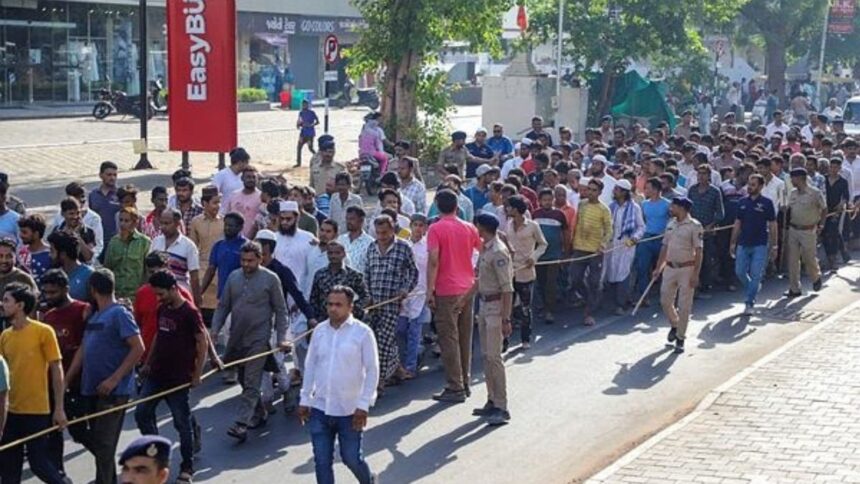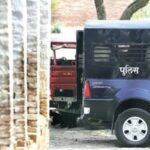The Union Ministry of Home Affairs (MHA) has set a 30-day deadline for states and Union Territories to verify the credentials of persons suspected to be illegal immigrants from Bangladesh and Myanmar who claim to be Indian citizens. After the 30-day period, if their documents are not verified, they will face deportation, it is learnt.
In a set of instructions issued this month, the MHA asked states and UTs to invoke their statutory powers to detect, identify and deport illegal immigrants. They have also been asked to establish sufficient district-level detention centres to hold individuals pending deportation.
The instructions are part of the Centre’s renewed push against undocumented, illegal immigrants from Bangladesh and Myanmar. The instructions have also been issued to the directors general (DGs) of the Border Security Force (BSF) and Assam Rifles — forces that guard India’s borders with the two countries.
In February, Union Home Minister had said strict action should be taken against any network that helps illegal Bangladeshi and Rohingya immigrants enter the country, obtain documents, and facilitate their stay. “The issue of illegal intruders is also related to national security, and it should be dealt with strictly. They should be identified and deported,” Shah said.
Since then, states like Rajasthan and Gujarat have launched efforts to identify and detain people suspected of being illegal immigrants from Bangladesh. As reported earlier by , Gujarat has carried out search operations in and and detained 6,500 such people. Rajasthan sent its first batch of 148 illegal Bangladeshi immigrants — rounded up by police under a special drive — to West Bengal this week on a special flight as part of the process by which they will eventually be sent back to their country of origin, police sources said.
Following Shah’s statement, a senior officer in the paramilitary forces told The Indian Express that the Centre reviewed the deportation process and issued “revised instructions” in the first week of May to streamline and accelerate it.
Explaining what has changed with the new set of instructions, the officer said that earlier, there was no deadline for sending back illegal immigrants, and sometimes, receiving a verification report from another state, to which they claimed to belong, could take months. “But now, the Centre has asked states/UTs and district collectors/district magistrates to ensure that an appropriate credential report is sent to the deporting state/UT within a period of 30 days. The suspected person, for 30 days, should be kept in the holding centres, and if no report is received within that period, the Foreigners Registration Offices should deport them,” the officer said.
Another officer said, “Usually, in serious cases like murder and kidnapping, we would send our personnel to another state to verify some documents. But in the case of deportation of illegal immigrants, we used to just send it (request for verification) to the state concerned and wait for months.”
“The Centre has now asked all state governments and UT administrations to set up a special task force in each district, under the police, to detect, identify, and deport illegal immigrants. They have also been asked to establish adequate holding centres in each district to detain illegal immigrants,” the officer said.
Further, as per the MHA’s instructions, all states and UTs should maintain a record of illegal Bangladeshi nationals and Rohingyas handed over to border forces and the Coast Guard for deportation, and mandatorily share a report in this regard with the Centre on the 15th of every month.
Also, the Bureau of Immigration has been asked to publish a list of deportees on a public portal. This data will also be shared with the UIDAI, the Election Commission and the Ministry of External Affairs to prevent the issuance of Aadhaar IDs, voter cards, or passports to such individuals in the future. If such documents are already held by illegal immigrants, these documents can be deactivated and the linked benefits discontinued.
Several instances of people identified as foreigners from Bangladesh and Myanmar being “pushed back” into their countries of origin have been reported recently. This is different from a formal deportation or handing over of the foreigners to authorities in their countries.
Earlier this month, Bangladeshi and Rohingya inmates of the Matia detention camp in Assam were “pushed back” into Bangladesh, a development confirmed by Assam Chief Minister . As of the end of April, there were 64 Bangladeshi and 103 Rohingya inmates in the camp, including 41 children.
Sarma said the inmates were pushed into Bangladesh as part of an “operation” by the Indian government. He also told reporters in that “push backs” along the Bangladesh border have been “institutionalised” by the Assam government as an alternative to the legal process of dealing with “infiltrators”.
A petition had been presented before the Supreme Court this week, alleging that 38 Rohingya refugees detained in had been forcibly sent back and pushed into Myanmar. However, the court on Friday observed that it did not find any material in the petition to substantiate the claims.
An “illegal migrant” has been defined in the Citizenship Act’s section 2, sub-section (1), clause (b), to mean a “foreigner who has entered into India without a valid passport or other travel documents and such other document or authority as may be prescribed by or under any law in that behalf, or with a valid passport or other travel documents and such other document or authority as may be prescribed by or under any law in that behalf, but remains therein beyond the permitted period of time”.
Last year, 295 Bangladeshis were deported, and this year, until April 30, around 100 Bangladeshi citizens have been deported and handed over to the Border Guards Bangladesh (BGB).
Prior to this, Manral had extensively reported on city-based crime stories along with that he also covered the anti-corruption branch of the Delhi government for a decade. He is known for his knack for News and a detailed understanding of stories. He also worked with Mail Today as a senior correspondent for eleven months. He has also worked with The Pioneer for two years where he was exclusively covering crime beat.
During his initial days of the career he also worked with The Statesman newspaper in the national capital, where he was entrusted with beats like crime, education, and the Delhi Jal Board. A graduate in Mass Communication, Manral is always in search of stories that impact lives.








